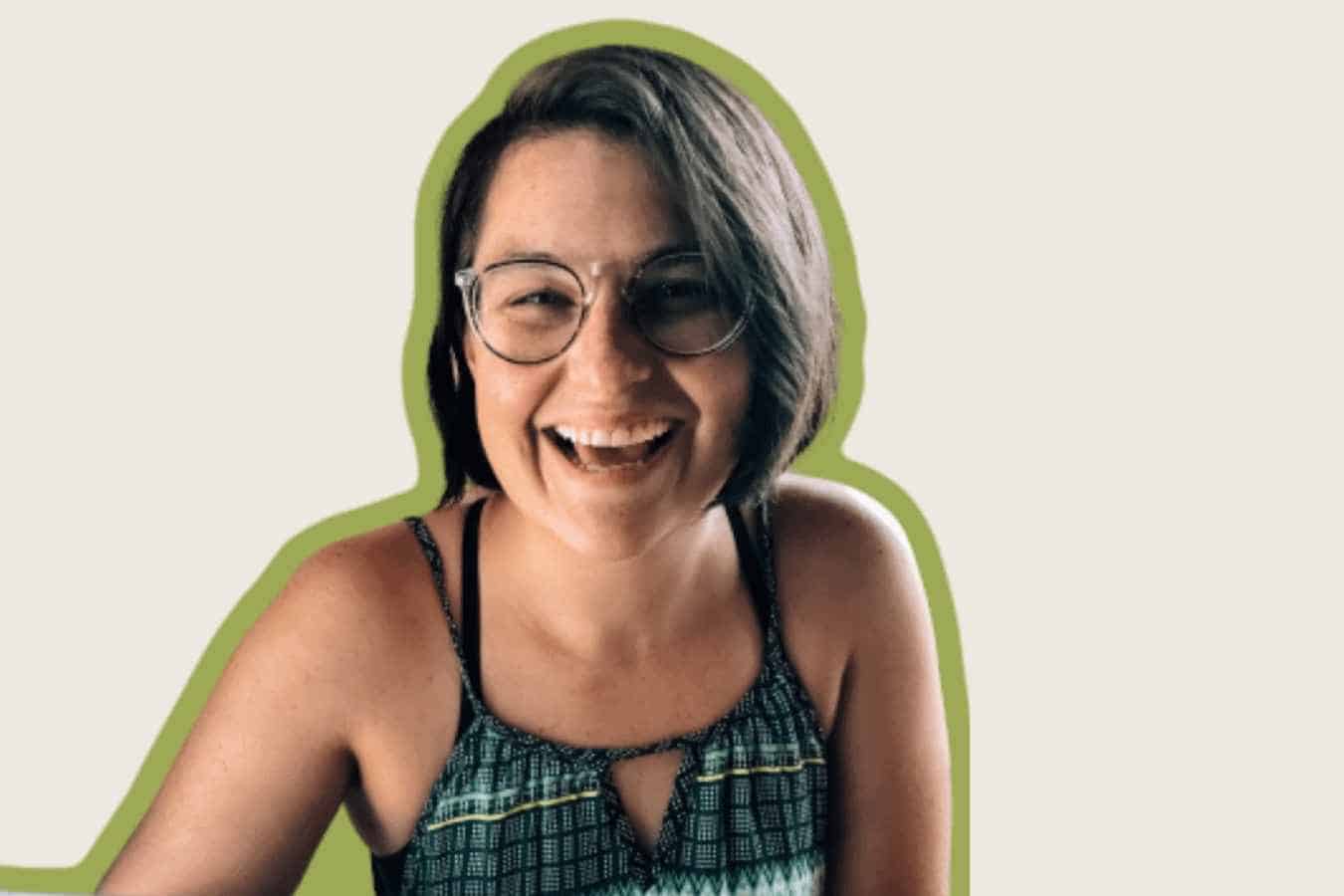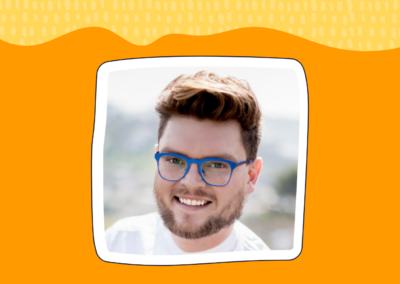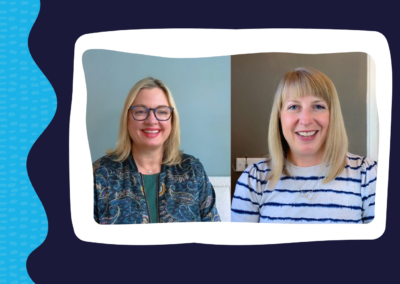Freelance writer Rachel Meltzer is taking a whole new approach to work. She’s adopted nomad life and made the move from barista to freelance writing and coaching. In this conversation, Rachel sheds light on what inspired her career transition, the internal convos she had with herself on finding her own writing niche, being her own boss and creating sustainable streams of income.
In between it all, is the need to manage your mental wellbeing. Rachel also dives into how she avoids burnout while managing her imposter syndrome, and shares her advice for like-minded creators looking to ditch their full-time gig in search of professional and financial independence.
Q: How have your skills from being a barista and other gigs translated to supporting your work as a freelance writer?
Rachel: Soft skills translate incredibly well to the communications aspect of my job. The gigs that I had, from barista to legal aid, all helped prepare me to communicate with my clients professionally while keeping a friendly tone. They also taught me how to do the parts of the job that aren’t as fun without feeling like it was a hassle. Working a job you don’t particularly want to, sets you up to be that much more grateful for the job of your dreams (freelancing and coaching for me!)
Q: What was your “aha” moment when you realized you wanted to, or needed to, switch professional gears
Rachel: In 2017, I made the hard choice not to continue pursuing law school. I moved back in with my parents and had no idea what to do with my life. I’d been working at Starbucks for almost a year at that point and decided to thru hike the Appalachian Trail in 2018. I embarked on my thru hike in February of 2018 and completed it in September of that same year. When I came back home to my parents and went back to my job at Starbucks, I realized I couldn’t keep doing it.
Since I graduated from high school in 2012, I’d been dreaming of vanlife. I researched how to make it happen but it felt like a pipe dream. I was scared of trying to be an entrepreneur after seeing my parents fail so many times. But in 2018 when I returned home, my parents were finally the owners of their first successful business. Working at Starbucks and seeing van-lifers online living their dreams while helping my parents out at their business, I realized I had to try.
At the time, I was living in a camper trailer in the woods in Maine. We had no plumbing and only an extension cord run from my parents’ nearby mobile home to power my work. I had every reason to think freelancing wouldn’t work. I borrowed my Dad’s old Chromebook, made an Upwork account, and used my iPhone as a hotspot. The day after I made my Upwork account, I quit my job at Starbucks.
It was sort of a build up from 2012-2018 of the itch to make vanlife happen and live more freely that eventually turned me toward freelance writing.
Q: What inspired you take on “vanlife” and how has the experience impacted your career decisions?
Rachel: Ever since I finished high school back in 2012, I knew I wanted to do vanlife. I don’t enjoy staying in one place for long. I also love the discomfort of vanlife and backpacking because they force you to grow and accept the little annoying parts of life. I’ve never felt at home in a specific place. To me, vanlife represented safety, ownership, and adventure – everything I’ve been craving.
In order to make vanlife happen I either needed to save up a lot of money, which felt impossible, or find a job that I could work remotely. Even with a college degree and years of office experience, a remote job was extremely difficult to land. I saw that other vanlifers (on Youtube and Instagram) were freelancers. I had no idea what I was getting myself into but I decided to take the leap anyway. If you’re persistent and resourceful, you’ll figure it out.
Q: Navigating your passion and job can be super challenging, especially when trying to merge both into a high paying career. What are some of the challenges you’ve navigated while becoming more comfortable with freelance income?
Rachel: At first, the freelance income was terrifying for me. It’s a rollercoaster. Growing up, our family never had enough money and I had to work extremely hard to rewrite my money mindset in order to succeed. I’m glad that I had help from a life coach, a gift from my sister, to work through that early on in my career.
Once you get through your first year and you work through your business foundations, you start to realize that it will all work out. You learn how to plan your income, get predictable work, and stop relying on crutches (like part time jobs) to make it through.
When I lost my part-time barista job at the start of the pandemic, I had no choice but to make my freelance income work for me. That fire under my ass was the scary forced leap that showed me I could do anything.
Q: What’s one of the first things you suggest everyone to do when considering switching career paths?
Rachel: I think people often assume that switching career paths means that they need to have a perfectly fleshed out business plan or an exact idea of the next job they want to get. In reality, I think that mindset is far more important. Set goals for what you want your new life to look like and then find the career path that will help you make that happen. When you’re open-minded but have a clear trajectory, things get a lot easier.
Make a list of needs and wants for everything from how much money you’ll make to how your schedule will look to how much time you’ll spend working with other people. Then, go and figure out how to make that happen. Maybe it’s freelance writing, like me, or maybe it’s a remote job or a contract position.
Q: In your Substack post, “Can I have more than one niche?” you share that the best niche is, “one in which you have room to learn and grow” because learning and growth are both “boredom killers.” What are you currently reading, or which podcasts are you listening to that help you stay inspired?
Rachel: My friend Marie-Pier Tremblay’s Self Growth Nerds podcast is one of my favorite listens at the moment. Marie is a passionate former thru hiker who comes from a freelance graphic design background and she’s focusing on mindset coaching now. I also love Don’t Keep Your Day Job with Cathy Heller and I find a lot of books that she shares on her show to be inspiring.
For books, I generally stick to memoirs. I find that they provide the relatability and life lessons in combination that drive me to keep going. Adventure books like No Horizon is So Far and Thruhiking Will Break Your Heart aren’t business books, per se, but they’ve informed the way I communicate and work toward my goals. I also love books like Freelance and Business and Stuff as well as The Content Marketing Writer to revisit for business planning.
Q: What are some of the challenges that flex workers may face that aren’t often talked about?
Rachel: Three major challenges that I wish were talked about more are the rollercoaster of emotions, what I call “missing the boat,” and learning how to trust yourself.
Firstly, there’s this perception – especially in the US – that there shouldn’t be any emotion in business. But, trust me, there are a lot of emotions and this is more extreme for those who run their own business.
Some days you’ll wake up ready and excited for work and then by noon, wonder why the heck you decided to do this and where did you even get the idea that you were capable of something like this?! Then other days you won’t even want to show up but you know you need to. The next day, you’ll be glad you did.
When you don’t have a boss, a massive business structure, or a pre-set schedule there’s no higher power to tell you when you’re doing it right (or wrong). Which brings me to trusting yourself. You have to build trust with yourself. Trust that you’re doing it right or that you’ll figure it out. That not working the traditional 9-5 is okay if that’s what you want or need. You have to build your own processes and stand by them – you can always change them later.
Lastly, what I call “missing the boat.” There’s this feeling that I’ve had since the beginning that there’s some manual out there that everyone else has that I’m missing. Or that maybe I’m just behind some magical “success boat” and I’ve missed the chance to get a ticket. Tune out what everyone else is doing. It’s okay to look at freebies or to read blogs for advice. But, at the end of the day, it’s your business and what works for you might not work for others. Here’s where one-on-one consulting and group coaching programs really helped me figure out what works for me, specifically.
Q: Oftentimes, the skills accrued during unemployment or part-time work can help lay the foundation for a rewarding career built off personal interests, experiences and skills. How do you believe larger media or tech organizations could support the creative freelance community?
Rachel: A simple place to start is working with more contractors and paying them the rates they deserve. It may seem daunting or unorthodox at first, but you may find that including these voices on your team can lead to revolutionary results. Freelancers provide an outside perspective. Sure, you hire them to do a specific task and they’ll execute it. But if you ask them, most of them will be able to tell you something that you’re missing from your marketing or ways to improve your systems to make working with freelancers easier in the future. Do your research and try to find out what a fair rate is for the services you’re asking. By not underpaying freelancers, you’re supporting the community and showing them that you respect their work.
Another way to support the freelance community is by creating learning opportunities. Many larger companies provide a free educational workshop or two and use it as a chance to vet freelancers through a live online experience. These workshops can lead to great hires who are willing and excited to work and learn from you. You get to work with them to perform the way that you prefer and they get to learn and grow with you. Plus, the services you need done in large batches will be getting accomplished consistently. It’s a win-win.
Q: May is Mental Health Awareness Month. Which of your personal or professional experiences have you found to be most difficult when balancing mental health?
Rachel: I was raised in a household where “burnout” was something for people who were more privileged than us. When the going got tough, working harder was always the answer. When I first started freelancing, I pushed myself to burnout constantly. It’s something I still struggle with. I’ve had to teach myself to be okay with taking breaks, to not shame myself for resting, and to not take on too much work at one time. Burnout often leads to flare ups of my depression and anxiety in an extreme way, so I try to avoid it as much as possible now.
Q: There are several stigmas around taking on freelance work, like the false belief that “you’re going to be poor because you won’t make enough money.” Have you received any negative messaging around your decision to become a freelance writer? If so, how did you navigate those conversations?
Rachel: Certainly! Most of these comments have been made by family members of an older generation. These people, I’ve learned, aren’t worth the energy of proving wrong. What they think doesn’t matter because they’ll never pay my bills. You may struggle financially at first, but you’ll figure it out and, at least for me, it’ll be worth it in the end to ignore the naysayers. You only have so much energy, save it for your work.
I want so badly to prove them wrong, of course, but I’ve learned to channel that energy toward finding other people who are supportive of my work and surrounding myself with those people instead of fixating on what the naysayers think. It’s rare to change someone’s mind, it’s common to grow when you surround yourself with people in a growth mindset.
Q: Last year you published a piece on overcoming imposter syndrome. What differences in your thoughts and behavior have you noticed since recognizing you sometimes struggle with imposter syndrome?
Rachel: The interesting thing about imposter syndrome is that it never really goes away. It comes in waves. Recognizing it for what it is and the other feelings it may trigger within you is important. I often still get hit with waves of imposter syndrome.
It was imperative for me to notice when I was shaming myself and when I was comparing myself to other freelancers and writers. The best way that I’ve found to work through imposter syndrome is to lean on others in my field who have been through or are going through what I am going through. Then, make a plan to tackle whatever tasks have brought up my imposter syndrome.
For additional perspectives on recognizing and understanding imposter syndrome, exercises to overcome it, and finding your creative outlets, read Rachel’s personal story here.
Rachel’s Socials: LinkedIn, Twitter, Instagram
Editor’s Socials – Dominque Dajer: LinkedIn, Twitter,Instagram



